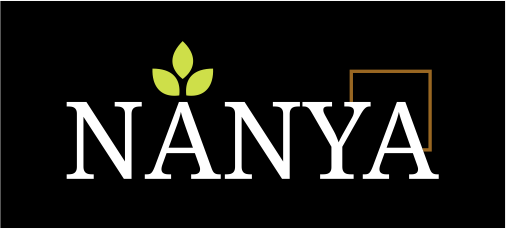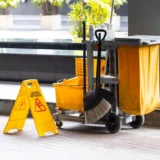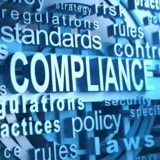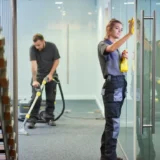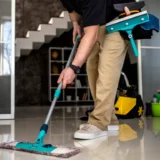Facility management covers everything required to keep a workspace running efficiently. From the systems that support your building’s infrastructure to the daily services that maintain hygiene and order, the scope is wide. But not all services serve the same function.
Some support the physical structure. Others shape how people experience the environment.
Understanding the difference between hard and soft services in facility management helps you manage both sides with clarity. One focuses on safety and functionality. The other focuses on cleanliness, comfort, and day-to-day operations.
Let’s look at each side and why both matter equally for your business.
What Are Hard Services in Facility Management?
Hard services refer to the technical and structural operations that keep a building in working condition. These are physical assets that require routine inspection, repair, and sometimes regulatory compliance.
They are usually non-negotiable. If any of these systems stop functioning, your business feels the impact immediately.
Common hard services include:
- Heating, ventilation and air conditioning systems (HVAC)
- Electrical systems and power distribution
- Plumbing and water supply systems
- Fire alarms and fire suppression equipment
- Elevator and escalator maintenance
- Building structure upkeep and repairs
- Generator and backup power system checks
These hardware facility services are often mandated by law. A malfunctioning fire alarm system or a failed HVAC unit does more than create discomfort. It can lead to safety risks, compliance issues, and downtime that affects your team and clients.
What Are Soft Services in Facility Management?
Soft services focus on the people using the facility. These tasks keep the environment pleasant, safe, and organized for staff, visitors, and clients. They are service-oriented rather than technical, but they play a huge role in shaping the workplace experience.
These services are visible, noticeable, and often affect how employees and visitors perceive your space.
Common soft services include:
- Housekeeping and janitorial cleaning
- Front desk and reception management
- Security guard services
- Waste disposal and recycling
- Pest control
- Landscaping and garden maintenance
- Office pantry and mailroom services
- Disinfection and hygiene support
These software facility services don’t involve wiring or machinery, but their absence creates immediate discomfort. A well-maintained space reflects professionalism and concern for well-being. That’s why soft services are essential for any modern workplace.
Hard vs Soft Services: A Clear Comparison
Both categories are important, but they serve different functions. Here is a straightforward comparison.
| Aspect | Hard Services | Soft Services |
| Nature of work | Technical and infrastructure-based | People-focused and hygiene-related |
| Type of service | HVAC, plumbing, electrical, fire safety | Cleaning, reception, security, pantry support |
| Legal requirement | Often mandatory under safety and compliance laws | Not mandatory but critical for hygiene and comfort |
| Staff involved | Engineers, electricians, technical specialists | Cleaning staff, guards, front office personnel |
| Maintenance cycle | Periodic inspections and scheduled servicing | Daily, weekly, or on-demand cleaning and support tasks |
| Impact of failure | Operational disruption and safety risks | Decline in hygiene, morale, and service quality |
Hard services make your facility operate. Soft services help people thrive in that environment.
Why Businesses Need Both Hard and Soft Services?
Relying only on technical systems without supporting people’s day-to-day needs creates an imbalance. A strong facility management plan includes both sides because they work together to support your business.
For example, clean air comes from a working HVAC system. But unless someone is regularly cleaning the filters and dusting the vents, indoor air quality suffers. Similarly, a clean restroom requires both functional plumbing and routine disinfection.
Here’s what happens when both are managed correctly:
- Reduced maintenance issues and technical failures
- Healthier work environment with lower absenteeism
- Better productivity and employee satisfaction
- Stronger first impressions on clients and visitors
- Safer workplace with fewer risks or hazards
- Higher chances of compliance with safety regulations
Facilities that manage both hardware and software services perform better in the long term. They avoid last-minute breakdowns, maintain clean and secure workspaces, and offer a positive experience for everyone.
Conclusion
Workplaces operate best when infrastructure and services are in sync. Technical systems create stability. Soft services improve usability and workplace experience.
Ignoring either category can lead to inefficiencies, poor hygiene, and safety risks. But when you partner with one of the best facility management companies in Bangalore that handles both, your business stays protected, productive, and ready for anything.
A well-balanced facility supports your people and your operations. And that leads to better performance across the board.
Need the Right Facility Services for Your Business ?
Whether your priority is equipment maintenance, cleaning schedules, or front desk support, having the right mix of services keeps your operations running without disruption.
Visit www.nanya.llc to explore service plans tailored for your facility. Let’s build a workspace that supports your team and reflects your values.
Frequently Asked Questions(FAQs):
1. What do hard and soft services in facility management mean?
Hard services are infrastructure-related like electrical, plumbing, and HVAC. Soft services focus on hygiene, cleanliness, security, and front office operations.
2. Can I outsource both types of services to one company?
Yes. At Nanya, we provide integrated solutions that combine both hard and soft services under one management team, including asset management.
3. How do I know which services my office needs more?
Start with a facility audit. Identify areas with frequent issues, user complaints, or compliance risks. This will help you prioritize between technical and hygiene-focused services.
4. Why are soft services important if hard systems are working fine?
Soft services influence workplace health, safety, and client impressions. Cleanliness, security, and hospitality matter just as much as technical reliability.
5. How frequently should hard and soft services be scheduled?
Hard services usually follow monthly, quarterly, or annual schedules. Soft services are often daily or based on real-time requirements like footfall or event setups.
